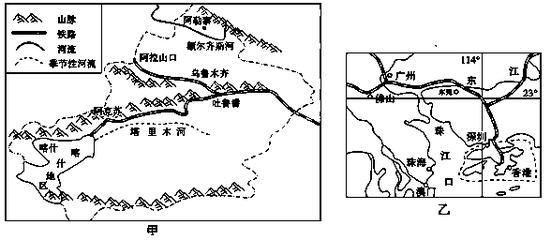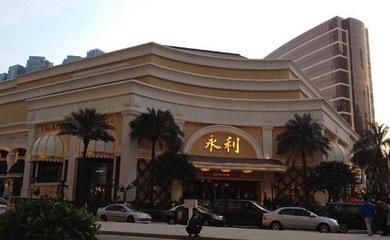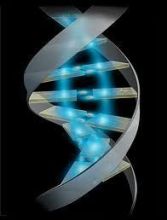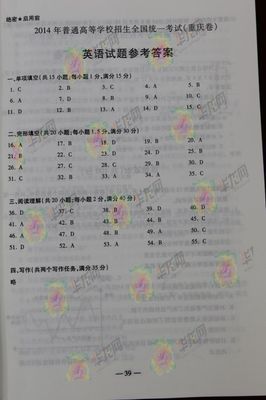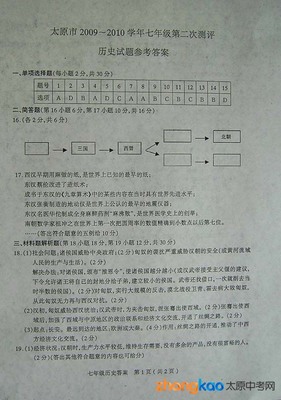2011-2012学年度高三第十次综合测试卷(由湖北省荆州中学2012届高三第三次质量检查卷校对改编)
第一部分:听力(满分30分)
做题时,先将答案划在试卷上。录音内容结束后,你将有两分钟的时间将试卷上的答案转涂到答题卡上。
第一节 (共5小题;每小题1.5分,满分7.5分)
听下面5段对话。每段对话后有一个小题,从题中所给的A、B、C三个选项中选出最佳选项,并标在试卷的相应位置。听完每段对话后,你都有10秒钟的时间来回答有关小题和阅读下一小题。每段对话仅读一遍。
1.Who did the man buy a jewel for?
A.Father.B.Mother.C.Sister.
2.What are the speakers talking about?
A.People.B.Country.C.Custom.
3.Who are the speakers?
A.Teacher and students.B.Motherand sons.C.Assistant and customers.
4.What can we learn about the movie?
A.Adults only.B.Enjoyable forall.C.Complex and frightening.
5.What will the man’s starting salary be a month?
A.$ 1,400.B.$4,000.C.$ 5,600.
第二节 (共15小题;每题1.5分,满分22.5分)
听下面5段对话或独白。每段对话或独白后有几个小题,从题中所给的A,B,C三个选项中选出最佳选项,并标在试卷的相应位置。听每段对话或独白前,你将有时间阅读各个小题,每小题5秒钟;听完后,每小题将给出5秒钟的作答时间。每段对话或独白读两遍。
听第6段材料,回答第6、7题。
6.What does Mother care about on the phone?
A.Her son’s health.B.Her son’sinterview.C.Her son’s job.
7.What do we know about the man?
A.He did a very good job with his study.
B.He is getting on well with his job.
C.He will start his work.
听第7段材料,回答第8、9题。
8.What happened to the speakers?
A.They met traffic jams.
B.They were on a boring bus.
C.They got off the bus at a wrong place.
9.What did they plan to do?
A.To go outing.B.To go to thetheater.C.To go to see a movie.
听第8段材料,回答第10至12题。
10.What is the trouble with the man speaker?
A.His grass – cutting machine went wrong.
B.His car engine went wrong.
C.His machine never worked.
11.How long can the machine be covered by a guarantee atmost?
A.Bought for six months.
B.Used less than seven times.
C.Bought within one year.
12.What is the man’s address?
A.612 Charles Avenue.
B.692 Charles Avenue.
C.694 Charles Avenue.
听第9段材料,回答第13至16题。
13.Who is Gabriella Rossi?
A.A trainer.B.Alearner.C.A horse rider.
14.What do we know about the man speaker?
A.He is good enough to ride.
B.He knows more to ride as a beginner.
C.He wants to ride to visit othercountries.
15.What should the school care most?
A.Lessons.B.Money.C.Safety.
16.What will the school provide the learners during the wholecourse?
A.A trainer together.
B.A beginner to learn together.
C.A rider who is well – trained.
听第10段材料,回答第17至20题。
17.Where is the speaker?
A.On the train.B.On theplane.C.On the ship.
18.What time is it when they leave Britain?
A.11:50.B.12:50.C.1:50.
19.What is the weather like during the journey?
A.Windy.B.Fine.C.Cool.
20.Where is the snack – bar?
A.On A deck.B.On Bdeck.C.On C deck.
第二部分:词汇知识运用(共两节, 满分30分)
第一节:多项选择(共10小题;每小题1分,满分10分)
从A、B、C、D四个选项中,选出可以填入空白处的最佳选项。
21. At the press conference a government spokesman expressed hisgreat ____________ for the safety of the three hostages.
A.sympathyB.concernC.sorrowD. anger
22. As everyone knows, all the doctors are required to keeppatients’ ____________ completely confidential(机密的)at alltimes.
A.recordsB.commentsC.conditionsD. treatments
23. Letters of ____________ are an advantage for job huntersbecause they provide credible and real evidence of pastachievements and abilities.
A.applicationB.introductionC. invitation D.recommendation
24.As role models,public figures have a duty to____________ themselves responsibly because teenagers often copytheir behavior.
A.containB.repeatC.conductD. distinguish
25. The news that the IMF has ____________ the Greek government’seconomic strategy is shocking to many economists all over theworld.
A. approvedofB. heardofC. thoughtofD. knew of
26.Through aggressive advertising, the company that producesfurniture managed to ____________ its share of the market.
A. takebackB. bringbackC. getbackD. put back
27. As the cities are being expanded, little of the _____________architecture remains, which is a great loss to the futuregenerations.
A.magnificentB.originalC.impressiveD. classical
28. Losing your temper with the client was a very ____________mistake: we have lost the contract which is very important tous.
A.unbelievableB.unavoidableC.carelessD. expensive
29. To find out which computer works well, researchers arecomparing the different types of home computer ____________available on the market.
A.currentlyB.previouslyC.regularlyD. recently
30. It seems that a number of people don’t think much of thegovernment that has been_______ for several years.
A. incontrolB. inactionC. inpowerD. in politics
第二节:完形填空(共20小题;每小题1分,满分20分)
阅读下面短文,从短文后所给各题的四个选项(A、B、C和D)中,选出最佳选项。
An elderlycarpenter who was very skillful with his hands was ready to retire.He told his employer of his plan to leave the house-buildingbusiness and live a more leisurely life with his wife. He wished to31 his life to the full before it was too late. He would32 the paycheck, but he needed to retire.
The employerwas sorry to see his 33 worker go and asked if he couldbuild just one more house as a personal 34. The carpentersaid yes, but over time it was easy to see that his 35 wasnot in his work. He resorted to(诉诸于,采取) bad and carelessworkmanship and 36 poor quality materials. There was nodoubt that it was an 37 way to end his dedicatedcareer.
When the carpenter finished his work, the employer came to38 the house, and he handed the front-door key to thecarpenter, 39 , “This is your house and this is my 40for you. ”
Hearing what the employer said, the carpenter felt not only shockedbut also 41. If he had known he was building his own house,he would have done it so 42. Now he had to live in the homehe had built.
So it iswith us. We build our lives in a distracted way, reacting ratherthan acting, willing to put up less than the best. At importantpoints we do not give the job our best 43. Then with a shockwe look at the situation we have 44 and find that we areliving in the house we have built. If we had 45 that, wewould have done it differently.
Think of yourself as the 46. Think about your house. Eachday you hammer a nail, place a board, or 47 a wall. Buildwisely! It is the only life you will ever build. Even if you livein it for only one day, that day deserves to be lived comfortablyand 48.
The plaque(匾) on the wall says,“ This is a do-it-yourself project.”Your attitude and the 49 you make today help build the houseyou will live in tomorrow. Who would say it more 50 ? Yourlife today is the result of your attitudes and choices in the past.Your life tomorrow will be the result of your attitudes and choicesyou make today.
31. A. spendB.enjoyC.startD.value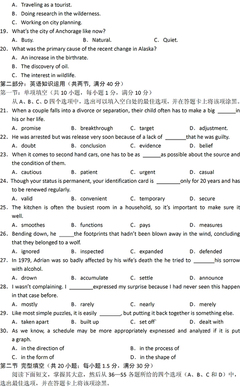
32. A. raiseB. rememberC.drawD.miss
33. A. goodB. generousC.loyalD.patient
34. A. serviceB.abilityC.opinionD.favor
35. A. energyB.attemptC.heartD.creativity
36. A. usedB.boughtC.gatheredD. ordered
37.A. unusualB. unfortunateC.impracticalD. incorrect
38.A. viewB.exploreC.inspectD.paint
39.A. announcingB. whisperingC.informingD. saying
40.A. giftB.propertyC.praiseD. encouragement
41.A. upsetB. embarrassedC.ashamedD. worried
42.A. carefullyB. differentlyC.skillfullyD. patiently
43.A. partB.skillC.talentD.effort
44.A. facedB.createdC.savedD.improved
45.A. foundB. avoidedC.realizedD.gained
46.A. engineerB. employerC.carpenterD. designer
47.A. put upB. build upC. breakupD. tear up
48.A. in orderB. with dignityC.for pleasureD. at peace
49.A. decisionsB. commentsC.judgmentsD. choices
50.A. wonderfullyB.clearlyC.completelyD. wisely
第三部分:阅读理解(共20题;每小题2分,满分40分)
阅读下列A、B、C、D每篇短文后所给各题的四个选项(A、B、C和D)中,选出最佳选项,并在答题卡上将该项涂黑。
A
It was a Sunday and the heavy storm had lasted all night. Themorning after the storm, though, was beautiful: blue skies, warmair and a calm, inviting sea touching the shore gently.
My father realized it was a good day for fishing and invited mysister and me to go with him. I was only 14 and fishing had neverbeen my thing, but I decided to go all the same. I’m so glad Idid.
On the roadto the harbour we could see the terrible destruction on the coast,but the harbour itself was in fairly good shape. After all, it wasprotected by the arms of a bay that had only one tiny channel tothe sea. As we got on board, we noticed two big hums(脊背)in thedistance.
On approaching them, we saw it was a mother whale with her baby. Wecouldn’t believe it—there aren’t any whale along the coast here.The storm must have driven them across the ocean into the bay, inwhich the still water was so badly polluted that nothing couldsurvive.
The littlebaby whale actually as big as our boat was obviously stuck andcould not move. The mother dived under the water and came upsuddenly, making big whirlpools(漩涡)and waves. “She’s trying to helpher baby, but on the wrong side,” my father said. At this point, myfather moved our boat in a semicircle to the other side and,heading the boat towards the baby whale, pushed it gently. With ourseveral gentle pushes the big hump turned over and disappearedunder water. Then it swam up right beside its mum. They struggledin their desperate attempts to escape but missed the exit andstarted heading in the wrong direction. We hurried up to the whalesand tried to lead them towards the bay channel. Slowly, they let uslead them, sometimes rising from the water right beside us tobreathe and to give us a trusting look with those huge eyes. Oncethey hit their first part of clean water flowing straight from thesea, the mum gave us a wave with her tail and off they swam intothe distance.
In the excitement it had felt like only a few minutes, but we hadbeen with those wonderful animals for almost an hour and a half.That was the simple and lasting beauty of the day. Nearly fourdecades later, I still look back fondly to that golden day atsea.
51.The author says “I’m so glad I did.”(inPara.2)because_______.
A. he witnessed the whole process offishing
B. he enjoyed the beauty of the calm sea
C. he experienced the rescue of the whales
D. he spent the weekend with his family
52.The harbor survived the storm owing to ______.
A. the shape of theharborB. the arms of onebay
C. the still water in thechannel D. the long coastline
53.The mother whale failed to help her baby because _______.
A. she had stayed in the polluted water for toolong
B. the whirlpools she had made were not bigenough
C. she had no other whales around to turn forhelp
D. the waves pushed her baby in the wrongdirection
54.What is the theme of the story?
A. Saving lives brings people a sense ofhappiness.
B. Fishing provides excitement forchildren.
C. It’s necessary to live in harmony withanimals
D. It’s vital to protect the environment.
B
For many parents, raising a teenager is like fighting a long war,but years go by without any clear winner. Like a border conflictbetween neighboring countries, the parent-teen war is aboutboundaries: Where is the line between what I control and what youdo?
Both sides want peace, but neither feels it has any power to stopthe conflict. In part, this is because neither is willing to admitany responsibility for starting it. From the parents’ point ofview, the only course of their fight is their adolescents’ completeunreasonableness. And of course, the teens see it in exactly thesame way, except oppositely. Both feel trapped.
In this article, I’ll describe three no-win situations thatcommonly arise between teens and parents and then suggest some waysout of the trap. The first no-win situation is quarrels overunimportant things. Examples include the color of the teen’s hair,the cleanness of the bedroom, the preferred style of clothing, thechild’s failure to eat a good breakfast before school, or histendency to sleep until noon on the weekends. Second, blaming. Thegoal of a blaming battle is to make the other admit that his badattitude is the reason why everything goes wrong. Third, needing tobe right. It doesn’t matter what the topic is——politics, the lawsof physics, or the proper way to break an egg——the point of thesearguments is to prove that you are right and the other person iswrong, for both wish to be considered an authority ——someone whoactually knows something ——and therefore to command respect.Unfortunately, as long as parents and teens continue to assume thatthey know more than the other, they’ll continue to fight thesebattles forever and never make any real progress.
55.Why does the author compare the parent-teen war to a borderconflict?
A. Both can continue forgenerations.
B. Both are about where to draw the line.
C. Neither has any clearwinner.
D. Neither can be put to an end.
56.What does the underlined part in Paragraph 2 mean?
A. The teens blame their parents for startingthe conflict.
B. The teens agree with their parents on thecause of the conflict.
C. The teens accuse their parents of misleadingthem.
D. The teens tend to have a full understandingof their parents.
57. Parents and teens want to be right because they want to______.
A. give orders to theother
B. know more than the other
C. gain respect from theother
D. get the other to behave properly
58.What will the author most probably discuss in the paragraph thatfollows?
A. Causes for the parent-teenconflicts
B. Examples of the parent-teen war
C. Solutions for the parent-teenproblems
D. Future of the parent-teen relationship
C
Electric cars are dirty.In fact, not only are they dirty, theymight even be more dirty than their gasoline-powered cousins.
People in California love to talk about "zero-emissions(排放)vehicles", but people in California seem to be clueless about whereelectricity comes from.Power plants most all use fire to makeit.Apart from the few people who have their roofs covered withsolar cells, we get our electricity from generators(发电机).Generatorsare fueled by something--usually coal, oil, but also by heatgenerated in nuclear power plants.There are a few wind farms andgeothermal(地热) plants as well, but by far we get electricity mainlyby burning something.
In other words, those "zero-emissions" cars are likelycoal-burning cars.Because the coal is burned somewhere else , itlooks clean.It is not true.It's as if the California Greens arecovering their eyes--"If I can't see it, it's not happening.”Gasoline is an incredibly efficient way to power a vehicle; agallon of gas has a lot of energy in it.But when you take thatgas(or another fuel)and first use it to make electricity, you wastea nice part of that energy, mostly in the form of wasted heat--atthe generator, through the transmission lines, etc.
A gallon of gas may drive your car 25 miles.But the electricityyou get from that gallon of gas won't get you nearly as far -- soelectric cars burn more fuel than gasoline-powered ones.If ourelectricity came mostly from wind or geothermal, or solar, then anelectric car truly would be clean.But for political, technical, andeconomic reasons, we don't use much of those energy sources.
In addition, electric cars' batteries which are poisonous for along time will eventually end up in a landfill.And finally, whencars are the polluters, the pollution is spread across all theroads.When it's a power plant, though,all the junk is in oneplace.Nature is very good at cleaning up when things are not tooconcentrated,but it takes a lot longer when all the garbage is inone spot.
59.What’s the main idea of the passages?
A.Electric cars aren’t actuallyclean.
B.Electric cars are zero-emissionsvehicles.
C. Zero-emissions vehicles arepopular.
D.Gasoline-powered cars are more efficient.
60.Which of the following words can replace “be clueless about” inParagraph 2?
A.Be familiarwith.B.Be curious about.
C.Fail tounderstand.D.Show their interest in.
61.In the author’s opinion, compared with cars using gas, electriccars are more __________.
A.environmentally-friendlyB.expensive
C.efficientD.harmful
62.It can be inferred from the passage that __________.
A.electric cars' batteries are poisonous for along time
B.now electric cars are used more than theirgasoline-powered cousins
C.zero-emissions vehicles should be chosen toprotect our environment
D.electric cars are not clean in that we getelectricity mainly by burning something
D
Elephants scored a big win in 2010. Representatives from 175countries at the United Nations’ Convention on the InternationalTrade in Endangered Species (CITES) in Doha, Qatar, rejected a bidto allow the sale of ivory. Two African nations, Tanzania andZambia, had asked to open the ivory trade.
Conservationists feared that weakening a 21-year-old ban on thesale of ivory would have encouraged illegal hunting and hurtelephant populations. African elephants once numbered in themillions. Today, there are fewer than 500,000.
“People born in 100 years should be able to see an elephant, ” saidNoah Wekesa, Kenya’s minister of forestry and wildlife. His countryvoted to keep the ban.
In the 1980s, as many as one million elephants were killedthroughout Africa. Hunters killed the animals for their ivorytusks, which were used to make jewelry and other items. “ Theslaughter(残杀) of elephants in Africa was just terrible, ” says PaulTodd of the International Fund for Animl Welfare ( IFAW ). Thegroup works to protect animals.
The ivory wars continued until 1989, when CITES voted to ban alltrade in ivory. With trade controlled, demand for ivory fell.Elephant populations began to increase slowly.
Tanzania and Zambia asked CITES to allow ivory sales fromgovernment stockpiles (库存). Ivory is so expensive that it’s knownas “white gold”. Tanzania holds almost 200,000 pounds of ivory,which is worth as much as $20 million. Zambia has 48,000 pounds ofthe “white gold”. The two countries argued that their ivory hadbeen taken from hunters or had come from animals that diednaturally. They said this income from the sale of ivory would helpthe countries.
Wildlife experts, who believe that the ivory trade encouragesillegal hunting, cheered the CITES decision. “It’s a rare victoryfor elephants,” said Jason Bell-Leask, the IFAW’s director forsouthern Africa.
63. What is the purpose of the passage?
A. To show us the ivory tradein Tanzania and Zambia.
B. To introduce the crisisthat elephants face in Africa.
C. To call on people aroundthe world to protect elephants.
D. To report the news of thebanning of ivory trade.
64. The sale of ivory wasn’t banned until __________.
A.2010B.2005C.1989D. 1980
65. What do we know from Noah Wekesa’s words in Paragraph 3 ?
A. He is worried about thefuture of elephants.
B. He thinks that elephantsshould be protected for a century.
C. He believes it has beenlate to issue the ban on the sale of ivory.
D. He is sure that the ban onthe sale of ivory will be effective.
66. What can we infer from the passage?
A. The income of Tanzania ismostly from the hunting of elephants.
B. The elephant population mayincrease if the ban on the sale of ivory is maintained.
C. Most Africanrepresentatives disagreed with the ban on the sale of ivory.
D. About one million elephantshave been killed throughout Africa since 1980.
E
“Fathers should be neither seen nor heard,” wrote Oscar Wilde.“thisis the only proper basis for family life.” it’s hard to say whatWilde would have thought of this week’s cover photo or the picturesinside of dads and their children.Several clearly oppose theoutdated idea of fathers as detached(使分开, 使分离) from the parentingprocess and that’s just what the photographers intended.
Gregory Heisler, who did the cover photograph, says he wanted theimage to show genuine affections.So, rather than use professionalmodels, he went out and found some “real dads and their real kids.”Adds Heisler: “Instead of doing some skilful, over-producedphotographs, I wanted something more authentic to the experience ofbeing a father.” This isn’t the first time that Heisler, 39, hasconveyed complex ideas for the cover of TIME.His photographs havedecorated the front of the magazine some 20 times, ranging fromOlympic athlete Jackie Joyner-Kersee and director Davis Lynch toformer President George Bush and Ted Turner for the Man of the Yearissues in 1991 and 1992, respectively.But this week’s TIME coverhas special meaning, he says, because he and his wife had theirfirst child, Lucy, 16 months ago.
The pictures appearing inside were all done by photographer JeffreyLowe.Although Lowe has not experienced fatherhood yet, he observedmany warm moments of parenting by spending a lot of private timewith each dad and child.Of all the pictures.Lowe was most deeplytouched by the father-to-be embracing his pregnant wife.
While most of the credit for the pictures rightly goes to thosebehind the camera, cover coordinator (协调者) Linda Freeman andassistant picture editor Mary Worrell Bousquette, who work behindthe scenes, also deserve praises.Freeman, for instance, had thechallenging task of making arrangements for the group portrait ofchild movie stars that appears on page 62.Says she: “My greatestreward is working with these talented artists.” Bousquette editedthe pictures that appear inside.“I wanted our story to show themany faces of fatherhood,” she says.At least in this issue, thosefathers are seen as well as heard.Sorry, Oscar.
67.In this week’s TIME the photographers wanted _______.
A.to show Oscar Wilde’s view had gone out ofdate
B.to show honor to the famous playwright OscarWilde
C.to support Oscar Wilde’sview
D.to say sorry to Oscar Wilde
68.In Oscar Wilde’s view, __________.
A.fathers should stay actively involved in theirchildren’s lives.
B.there should be distance between fathers andchildren in family life
C.what fathers enjoy most is family life
D.fathers aren’t sure about what they should doat home.
69.Jeffrey Lowe managed to show fathers’ feelings accurately in hisphotos by _______.
A.trying to experience fatherhood himself.
B.spending most of his time with his pregnantwife.
C.studying the relationship between each memberin a family.
D.mixing with many fathers and theirchildren.
70.What is the author’s main purpose in writing this passage?
A.To comment on Oscar Wilde’s view onfatherhood.
B.To make a brief introduction to the currentissue of TIME.
C.To give his own opinion on fatherhood.
D.To praise the work by the photographers and theeditors.
第四部分:主观题(共三节,满分50分)
第一节:完成句子(共10题,每小题2分,满分20分)
根据括号内英文单词提示完成下列句子。
71. When his mother came home from work, he was lying on the sofa,_________. (absorb)
母亲下班回家的时候,他正躺在沙发上专心致志地看书。
72. He has been suspected of taking government funds for himselfand _________________ by the police.(investigate)
他已被怀疑挪用政府资金,正在接受警方调查。
73. The outdoor training is an exercise ______________________build teenagers’ confidence. (design)
户外训练是旨在增强青少年自信心的一种运动。
74. I really admire her because she _____________________ thosekids on her own. (bring)
我的确佩服她,因为她全靠自己把那些孩子抚养大了。
75. We have to admit that adopting this technique is painful, butpatients _______. (benefit)
我们得承认采用这项技术会有点痛,但会对病人有益。
76._____________ different languages and cultures does a lot ofgood to children. (expose)
接触不同的语言和文化对孩子们大有裨益。
77. It is surprising that the young man____________________ in a big company aftergraduation. (employ)
毕业后那个年轻人竟然在一家大型公司就职了,真是令人讶异。
78._____________ whether or not he will be elected as mayor in twoyears’ time. (remain)
两年后他是否当选为市长仍不得而知。
79.______________________ this new policy will act as a brake oninflation we are faced with? (possibility)
这项新的政策有可能会抑制我们面临的通货膨胀吗?
80.I think that it is I rather than my sister_________________what happened. (blame)
我认为出了事不能怪姐姐而应该怪我。
第二节 短文写作 (共1题,满分30 分)
根据下图所示,请用英语写一篇关于个体与整体关系的短文。
词数:120左右。提示:
木桶:bucket
2011-2012学年度高三第十次综合测试卷参考答案
1—20: BACAC BCABACBBBC ACABA
21--30 BADCA CBDAC
31--50 BDADC ABCDA CBDBC CABDB
51—54CBDA 55-58BACC 59-62 A C DD 63-66DCDB 69-70 A B D C
完成句子
71.( and was )absorbed in a (his) book
72. is being investigated
73. that (which) is designed to/designed to
74. has brought up
75. can/may/will benefit from it
76. Being exposed to/Exposing themselves to
77. should have been employed/should have got employed
78. It remains to be seen
79. Is there any possibility that
80. that am to blame for
短文写作
In the picture, we can see a bucket made of pieces of wood. Onepiece is shorter, causing the water in the bucket to flowout.
The picture conveys a message that the success of a project dependson each individual part.When each individual part is of equalstrength, it is quite likely that the whole project will be asuccess. In the same way, when one piece is broken or shorter, thebucket can not hold as much water as is expected, as is shown inthe picture. Even a weakness in one part may lead to a completefailure of the whole project, so each individual part can make adifference between success and failure.
 爱华网
爱华网